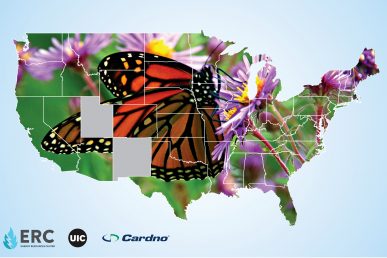UIC-led partnership aims to help create, preserve monarch habitat
A new, multi-sector partnership coordinated by the Energy Resources Center at the University of Illinois at Chicago is working together to develop a voluntary conservation agreement to aid the plight of the monarch butterfly.
Spanning more than 1.8 million acres of land over 45 states, 26 organizations — including agencies and businesses — are working to develop a Candidate Conservation Agreement with Assurances, or CCAA. The conservation agreement, a regulatory mechanism within the United States Fish and Wildlife Service, encourages non-federal landowners and managers to adopt measures that are beneficial to key wildlife species and pollinators.
In the last 20 years, the population of monarch butterflies in the eastern U.S. has declined by 80 percent, putting the species in jeopardy. A primary cause of this decline is the loss of lands containing native flowering plants the butterflies need for food, including milkweed species.
This CCAA will help monarchs by incentivizing energy companies and transportation agencies to voluntarily adapt their land management practices to include the planting of native plants, the use of Integrated Vegetation Management best practices, and other conservation measures to maintain plants that monarchs and other pollinators need for survival. Integrated Vegetation Management is the practice of promoting desirable, stable, low-growing plant communities that will resist invasion by tall growing tree species through the use of appropriate, environmentally sound and cost-effective control methods.
“Participating organizations can ensure that monarchs have more food and habitat available, while also continuing to deliver safe transportation and energy,” said Iris Caldwell, program manager of the University of Illinois at Chicago’s Energy Resources Center and lead coordinator of the partnership.
The U.S. Fish and Wildlife Service has been continually monitoring monarch population trends and evaluating existing conservation strategies with the goal of restoring the species to a sustainable level.
The CCAA builds upon several existing initiatives, including the Mid-America Monarch Conservation Strategy developed under the leadership of the Midwest Association of Fish and Wildlife Agencies and the collaborative efforts of the Rights-of-Way as Habitat Working Group organized by the University of Illinois at Chicago.
“Encouraging conservation measures throughout energy and transportation landscapes plays an important part in securing thriving populations of the monarch butterfly and other pollinators for generations to come,” said Caldwell.
Partner organizations include: American Electric Power, American Transmission Co., Alliant Energy, the Arizona Department of Transportation, the Colorado Department of Transportation, ComEd, Cypress Creek Renewables, the Delaware Department of Transportation, Duke Energy, IVM Partners, Exelon Generation, Fresh Energy, the Georgia Department of Transportation, the Illinois Department of Transportation, the Minnesota Department of Transportation, National Rural Electric Cooperative Association, NiSource, Pine Gate Renewables and the Ohio Department of Transportation.
Housed in the UIC College of Engineering, the UIC Energy Resources Center provides comprehensive and cutting-edge solutions for energy and environmental challenges in the institutional, industrial and commercial sectors.
The Energy Resources Center’s efforts are assisted by Cardno, an environmental consulting firm; the University of Georgia Business Law Clinic; and the Environmental Policy Innovation Center.

